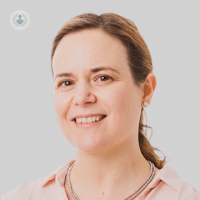What are the causes of fatigue in older adults?
Written in association with:While it’s common to experience tiredness in old age, ongoing or severe fatigue can indicate an underlying health issue that needs to be evaluated and monitored carefully by a specialist and a care team.
Here to provide an expert insight into fatigue in elderly adults, including causes, signs, and management, is Dr Maria Corretge, renowned consultant geriatrician and general physician with specialism in chronic fatigue and healthy ageing.

How is chronic fatigue defined in older people?
Chronic fatigue is defined the same way in older people as in younger people, but in older people it acquires a different dimension because it’s important not to overlook organic causes of fatigue.
When an elderly person becomes fatigued, there’s a natural tendency for people to dismiss it, attaching it to just a part of growing older. Of course, it’s important to have a little bit of acceptance, because a person is never going to be as fit or energetic as they were in their youth.
However, it’s equally important not to dismiss fatigue as part of the ageing process and to look into it to find out if there’s an organic cause for the fatigue, an ailment that can be treated, or a multifactorial issue that needs different levels of approach - from exercise and diet to medications or a medication review.
Many people also forget that as a person grows older, they might have less tolerance to the side effects of the medications that they were prescribed in their 40s-50s when they first developed health issues (for example, hypertension).
All these considerations require an expert team of specialists to look into very carefully and to work in partnership with the patient, putting the focus on what the patient wants and what the patient is feeling to try to get to the bottom of things.
What are the signs an older person may be suffering from chronic fatigue?
The signs are the same in all ages.
People could stop being as active as they were before; people could give up activities because they get breathless or simply, tired; people could become more apathetic or seem to be low in mood because they aren’t doing as many activities as before; people could have sleeping problems and their appetite could also change.
Sometimes, there could be physical changes as well with people looking older, feeling drained, or losing or putting on weight. In some cases, people experiencing fatigue could also develop neurological symptoms, such as twitches or a certain slowness in movement.
Likewise, there could also be physical signs that would need to be looked into in more detail to make sure that the patient isn’t developing common causes of neurological fatigue, such as Parkinson's disease or cerebrovascular disease.
Moreover, some people could also have tiny strokes when they are sleeping. These strokes have a risk of remaining unnoticed for a long time because they don’t lead to weakness in one hand or the face, or because the strokes aren’t very obvious.
Thus, in elderly people, fatigue is sometimes more than just an inner feeling – it’s something that people around them can identify.
What can cause chronic fatigue?
In elderly people, there’s a whole spectrum of medical conditions that can cause fatigue, just as in younger people. If in young people, for example, a cause of fatigue might be overactivity or lack of rest, in elderly people, there are ailments and conditions that can creep up. These include neurological conditions, such as Parkinson’s disease, cerebrovascular disease, or stroke, which can cause immense fatigue.
As well as this, dementia can also cause a lot of fatigue.
Medications are often also a cause. These include medications that elderly people take or have been taking for a long time, and medications that have stopped being as effective or as well-tolerated as they were before.
Likewise, anaemia or nutritional deficiencies can also cause fatigue, which might need to be looked into in more detail to determine if the source of the deficiencies is a severe condition (such as colon cancer) or if it could be that the person is eating less because they feel depressed.
Above all, it’s essential not to dismiss any of these causes as just a normal part of ageing.
How can chronic fatigue affect wellbeing and general health? Why is it important to see a specialist?
Since fatigue is a complex health issue, consultations for it are long. This is because a specialist has to ask many questions and build a relationship with the patient, so that the evaluation process doesn’t feel too intrusive or without purpose.
Elderly people sometimes also overlook their own fatigue to the extent that they don’t want to bother a specialist or they feel like they will be dismissed or not believed if they complain about the tiny symptoms that they are experiencing. Despite this, it’s very important to consult about fatigue, because there are things that can be done to help.
While it’s true that there’s a small group of elderly patients that will need to be told that they have to accept that they aren’t as energetic as before, this is a minority of people.
Usually, fatigue will be multifactorial, meaning that there are many factors that can add to the fatigue. For this reason, having a specialist that has thoroughly looked into a patient’s chronic fatigue and gotten to know the patient well is very beneficial, because if something goes amiss in the future, then specialist will be able to notice this and be able to explain that, yes, while the patient feels fatigued, this is what caused the fatigue before and this is what is causing it now. The specialist will be able to detect this difference and be able to point towards the right investigations from the very beginning.
How can chronic fatigue be managed in older patients?
Management really depends on the cause. Fatigue is multifactorial in many cases, and there are certain situations in which the fatigue sort of fits into a person’s own self, making it very difficult to break the cycle.
The solution isn’t a magic pill that will take away the fatigue - that doesn’t exist either for a younger or an older patient. Instead, management involves getting to the bottom of things and trying to address each cause in the best way possible. This could involve stopping medications; advising certain lifestyle changes; investigating the cause of a possible anaemia and treating it appropriately; managing an underlying neurological condition; or simply, preventing things from getting worse.
Thus, management really depends on each case. There’s no answer for fatigue as such, because fatigue is a symptom, not a disease.
Dr Maria Corretge is a renowned specialist in geriatric care and in the management of neurological conditions, such as Parkinson’s disease.
If you or a loved one is experiencing ongoing fatigue in old age, do not hesitate to visit Dr Corretge’s Top Doctors profile today to receive expert support and management.


